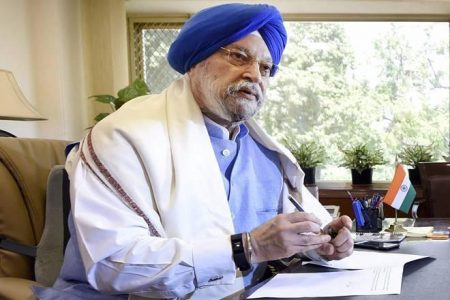
With globalization and urbanisation becoming integral to our prevailing world order, it is reasonable to assume that around 50% of India would inevitably reside in urban areas by 2030, the date of implementation of the agenda for Sustainable Developmental Goals, said Mr Hardeep Singh Puri, Hon’ble Minister of State (Independent Charge), Ministry of Housing and Urban Affairs. He was speaking at an interactive Panel on Building Blocks for a New India, at the India Economic Summit being organized by the World Economic Forum and the Confederation of Indian Industry (CII) at New Delhi today.
Mr Puri stated that the Swachh Bharat Mission recognises impending challenges of urbanization and called for mindset change by all stakeholders to help meet the specific targets under the Mission. The bio-mechanisation of waste, mechanical cleaning of drains etc, are some of the initiatives being contemplated by the government under the Mission.
While dwelling on the urban rejuvenation effort of the government through affordable housing, the impact of which would become visible by 2018, he said that there was no other option but to decongest the city. He exhorted the State governments to constructively engage with the Centre to help cities function effectively. He invited the private sector to partner with the government in the building of Smart cities and leverage the huge economic opportunity which it entailed. He also supported the need for an independent regulator in sectors such as real estate to clean up the system.
Mr. Sumant Sinha, Chairman and Chief Executive Officer, ReNew Power, called for automatic reset of power prices and separating carriage from content for freeing power pricing from government control. He also supported privatization of distribution companies for greater efficiency. The fixation of power tariffs, based on market demand, would lower production costs and make manufacturing competitive. He said that the perception that we have become power surplus is not correct as there is tremendous amount of suppressed demand in the economy.
Mr. Bunty Bohra, Chief Executive Officer, Goldman Sachs, India highlighted tapping the corporate bond market for long term finance for infrastructure and need for removing restriction on institutions so that corporates are clear about the risk return profile.
Ms. Keiko Honda, Executive Vice-President and Chief Executive Officer, Multilateral Investment Guarantee Agency (MIGA) stated that fixing power tariffs is a challenge for all countries. The government should consider providing support, if necessary. She also mentioned that the foreign investor is looking for investible projects. She advocated that the private sector should mitigate risks through taking recourse to MIGA
Mr. Chandrajit Banerjee, Director General, CII highlighted the challenges faced by the private sector while operating projects in the PPP mode. He especially dwelt on issues such as problems of land acquisition, structuring of PPPs, dispute resolution, and trust deficit, among others. He called for further streamlining of clearances and forward planning and hoped for the success of Real Estate Regulation Act (RERA) to reduce the demand and supply gap in infrastructure.
New Delhi



Leave a Reply
You must be logged in to post a comment.